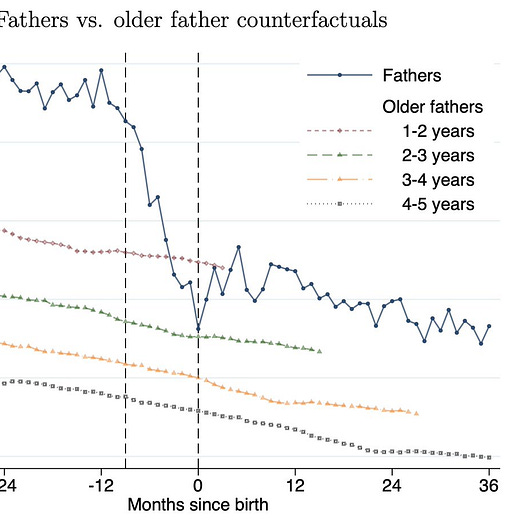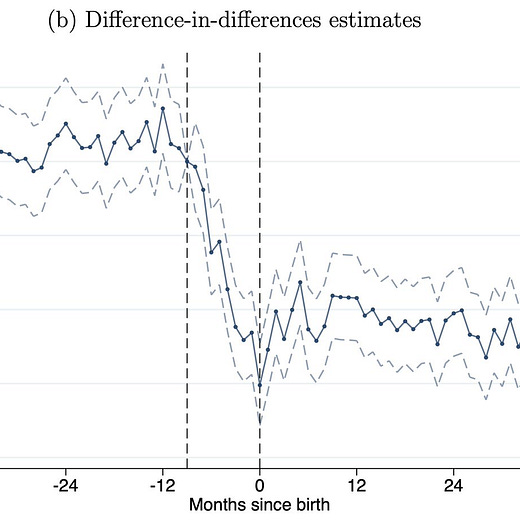Best of #econtwitter - Week of August 28, 2022 [1/4]
Aug 29, 2022
Welcome readers old and new to this week’s edition of Best of Econtwitter. Please submit suggestions — very much including your own work! — over email or on Twitter @just_economics.
This is part one of four.
Paper summaries

Rob Collinson@racollinson
🚨a quick thread about a long-running project now released as @nberpubs WP
This paper is joint w/ @john_eric , @WinnieVanDijk , Danny Tannenbaum, Davin Reed & Nick Mader. It replaces 2 separate studies of eviction in Chicago (Humphries et al) and NYC (Collinson & Reed)
1/N
12:01 PM · Aug 22, 2022
67 Reposts · 184 Likes

Rob Collinson@racollinson
What do we find?
#1 : eviction is typically proceeded by rising economic distress. We find patterns of: falling earnings (below), ⬇️ in employment, ⬆️ in unpaid bills, and ⬆️ in hospital visits.
This suggests many evictions are precipitated by adverse events.
5/N

12:01 PM · Aug 22, 2022
13 Likes

Rob Collinson@racollinson
Given the high costs to governments of providing health care and homelessness services, our results imply that there are considerable spillover costs for society from eviction.
9/N

12:01 PM · Aug 22, 2022
3 Reposts · 22 Likes

Avinash (Avi) Collis@avi_collis
🚨New Publication🚨
What happens when we restrict social media usage? @eggers_felix and I did a fun experiment at @univgroningen during the academic year 2018-19. Our paper is just out in @PLOSONE.
journals.plos.org/plosone/articl…
journals.plos.org
Effects of restricting social media usage on wellbeing and performance: A randomized control trial among students

6:52 PM · Aug 24, 2022
21 Reposts · 82 Likes
^“We don't find any noticeable effect on measures of subjective well-being and academic performance!”

Juliana Londoño-Vélez@juliana_londono
Does diversity affect people's perceptions of income distribution and their preferences for redistribution?
A quick summarizing 🧵on this NBER WP below:
nber.org/papers/w30386 [1/n]
nber.org
The Impact of Diversity on Perceptions of Income Distribution and Preferences for Redistribution

1:27 PM · Aug 22, 2022
102 Reposts · 425 Likes

Sandy Black@Econ_Sandy
A goal of public education is to improve economic
and social mobility. But schools often assign kids to classes based on academic ability, mimicking the stratification that education is intended to combat. Our new research studies this tracking in the US.
nber.org
Patterns, Determinants, and Consequences of Ability Tracking: Evidence from Texas Public Schools

11:49 AM · Aug 22, 2022
76 Reposts · 335 Likes

Melissa S. Kearney@kearney_melissa
Finding: Tracking increases inequality bc it *increases achievement at the top*
Eliminating academic tracking in the name of reducing gaps is a mistake.
We need to find ways to bring up kids at the bottom while pushing high performing kids to achieve all they are capable of.

Sandy Black @Econ_Sandy
Finally, when we explore how exposure to tracking correlates with student mobility in the achievement distribution, we find + effects on high-achieving students with no - effects on low-achieving students, suggesting that tracking may increase inequality by raising the ceiling.
9:26 PM · Aug 22, 2022
7 Reposts · 62 Likes

Evan Rose@evankrose
Here is the key graph for first-time dads.
The blue line plots arrest rates in the 3 years before/after their kid's birth. The other lines show arrest rates over the same ages for men who have kids when 1-5 years older.
The DinD effect is a 20% drop in arrests post-birth:


11:27 AM · Aug 24, 2022
3 Reposts · 21 Likes
Public goods

Alex Albright@AllbriteAllday
Useful resource for #econtwitter folks: Sangmin S. Oh maintains a HUGE list of ~plausibly exogenous variation~ used in empirical economics work.
It's called ✨Plausibly Exogenous Galore✨ and it's also a listserv you can join. bit.ly/3Q2ga9j

9:50 PM · Aug 24, 2022
142 Reposts · 674 Likes

Sam Asher@thesamasher
I'm assembling a list of online math classes that predocs can take before applying to grad school. Many either aren't at universities or don't get free classes. Important to have a lot of good, affordable options throughout the year @predoc_org @cblatts @paulnovosad @tylercowen
1:55 PM · Aug 24, 2022
22 Reposts · 181 Likes
Interesting discussions

Tom Moylan@moylato
The World Bank found that 31% of policy reports were never downloaded and almost 87% of were never cited.
But imagine if their experts were trained/supported in building an online community of their own, professionally presenting their work and creating value with each post.

6:11 AM · Aug 24, 2022
153 Reposts · 731 Likes

Benjamin Schmidt@benmschmidt
@ipeds_nces just released new data on degree completions for the 2021 class (the first class with a full semester during the pandemic.) History and Religion have both joined English in being down to half their 2000s peak; philosophy's rebound persists, while area studies falls.

10:57 PM · Aug 23, 2022
228 Reposts · 626 Likes

Benjamin Schmidt@benmschmidt
Here's the slightly longer term shifts from 2011-2021. The total outlier of computer science's explosion is really clear here: so is the concentration of growth in fields that have clear career prospects.

11:57 PM · Aug 23, 2022
103 Reposts · 403 Likes

Benjamin Schmidt@benmschmidt
Here's the really big picture: STEM and medical majors continue to take over. This is a choice that's been made by parents, policymakers, and students. Any talk about what happens to the humanities, the social sciences, even business needs to take this as the starting place.

12:01 AM · Aug 24, 2022
110 Reposts · 381 Likes

Benjamin Schmidt@benmschmidt
The downtick in humanities this year pushes up the ETA for when CS is larger than all humanities degrees together to one of the classes currently in college.

1:52 AM · Aug 24, 2022
86 Reposts · 292 Likes

Jon Askonas@JonAskonas
Short written assignments are FINISHED pedagogically. Educators need to wake up to this reality. There are alternatives: in-class blue books, oral exams, longer research papers (for now). But AI forces us to rethink our pedagogy.
This took me 10 seconds in GPT-3.

1:49 PM · Aug 23, 2022
109 Reposts · 639 Likes

Shooshan Danagoulian@Shooshan5
In July, following @jenniferdoleac's example, I hired a photographer for professional headshots. The outcome were pictures which I really like because they represent me well. While the expense was not insignificant, I think professional photos should be part of our development.

4:32 PM · Aug 24, 2022
1 Repost · 290 Likes

